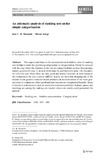Mostrar el registro sencillo del ítem
An axiomatic analysis of ranking sets under simple categorization
| dc.creator | Alcantud, José Carlos R. | es_ES |
| dc.creator | Arlegi Pérez, Ricardo | es_ES |
| dc.date.accessioned | 2018-11-27T11:22:20Z | |
| dc.date.available | 2018-11-27T11:22:20Z | |
| dc.date.issued | 2012 | |
| dc.identifier.issn | 1869-4187 (Print) | |
| dc.identifier.issn | 1869-4195 (Electronic) | |
| dc.identifier.uri | https://hdl.handle.net/2454/31501 | |
| dc.description.abstract | This paper contributes to the axiomatization of additive rules for ranking sets of objects under the psychological principle of categorization. Firstly we proceed with the case where the elements in the sets are categorized into at most three groups, namely good (with value 1), neutral (with value 0), and bad (with value−1). Secondly, we solve the case where there are only good and neutral elements. In both instances the evaluation of the sets is purely additive. Lastly, we show that dropping one of the axioms in our general characterization produces an axiomatization of the more general class of evaluations where good and bad elements are weighted differently. Areas of research in Economics such as committee selection problems, hedonic games and matching are among the ranking sets models where our results could potentially be applied. | en |
| dc.description.sponsorship | José C. R. Alcantud acknowledges financial support from the Spanish Ministerio de Ciencia e Innovación (Project ECO2009-07682), and from Junta de Castilla y León (Project SA024A08 and GR-99 Funding). R. Arlegi (corresponding author) acknowledges financial support from the Spanish Ministerio de Ciencia e Innovación (Projects SEJ2006-11510 and ECO2009-12836), and from Junta de Castilla y León (Project VA040A05). | en |
| dc.format.extent | 19 p. | |
| dc.format.mimetype | application/pdf | en |
| dc.language.iso | eng | en |
| dc.publisher | Springer | en |
| dc.relation.ispartof | SERIEs, (2012) 3:227–245 | en |
| dc.rights | © The Author(s) 2011. This article is distributed under the terms of the Creative Commons Attribution License which permits any use, distribution and reproduction in any medium, provided the original author(s) and source are credited. | en |
| dc.rights.uri | https://creativecommons.org/licenses/by/4.0/ | |
| dc.subject | Ranking sets | en |
| dc.subject | Additive representation | en |
| dc.subject | Categorization | en |
| dc.title | An axiomatic analysis of ranking sets under simple categorization | en |
| dc.type | info:eu-repo/semantics/article | en |
| dc.type | Artículo / Artikulua | es |
| dc.contributor.department | Economía | es_ES |
| dc.contributor.department | Ekonomia | eu |
| dc.rights.accessRights | info:eu-repo/semantics/openAccess | en |
| dc.rights.accessRights | Acceso abierto / Sarbide irekia | es |
| dc.identifier.doi | 10.1007/s13209-011-0061-8 | |
| dc.relation.publisherversion | https://doi.org/10.1007/s13209-011-0061-8 | |
| dc.type.version | info:eu-repo/semantics/publishedVersion | en |
| dc.type.version | Versión publicada / Argitaratu den bertsioa | es |



